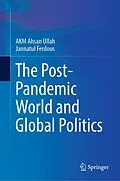The book examines the impact of COVID-19 on economic and political processes, contending that the global reaction to the pandemic has been the largest failure in scientific policy in a generation. Unlike earlier crises, it has impacted the world's leading economies while also paralyzing international ties, provoking diverse and far-reaching reactions. The authors posit that no effective global response has been launched in response to this global catastrophe. Rather, governments have implemented a variety of policies based on the costs of virus protection against financial closure and isolation. In doing so, there has been a resurgence in nationalism. This book aims to provide comprehensive understanding of how the pandemic has widened political gaps, and demarcates what the long-term consequences might be in terms of policies and economics in the wake of the pandemic. Of interest to scholars in political geography, development studies, international relations, public administration, and health science, this book presents key observations on existing theories of global politics pivoted around the COVID-19 pandemic, and its ramifications on individuals, groups, and ultimately, the nation state.
Autorentext
AKM Ahsan Ullah is Associate Professor in Geography, Environment and Development at the University of Brunei Darussalam (UBD). Dr Ullah's research portfolio includes stints at the Southeast Asian Research Centre (SEARC), Hong Kong; IPH, University of Ottawa, McMaster University; Saint Mary's University, and Dalhousie University, Canada; the American University in Cairo (AUC); City University of Hong Kong, Hong Kong, Osnabruck University, Germany, and Asian Institute of Technology (AIT), Thailand. His research areas include population migration, human rights, development, environment and health policy. Dr Ullah has contributed 60 scientific articles to refereed journals and at least 40 chapters in a number of books, and published 15 books.
Jannatul Ferdous is Associate Professor, Department of Public Administration, Comilla University, Bangladesh. Dr Ferdous received her bachelor, masters and MPhil in Public Administration from the University of Dhaka. Dr Ferdous contributed extensively to refereed journals and chapters in books. She published seven books. Her current interest includes governance, e-governance, trust, civil service system, gender, public policy, climate change, gender and development. Currently, she is serving as the Chair of the technical committee of the 'Combating Gender-Based Violence' project of UN Women. She is also serving as an assistant proctor of Comilla University.
Inhalt
Preface
Chapter 1
The Pandemic and Global Politics
Introduction
The politics of the origin-trace
Argument, objectives and methods
Political geography of the pandemic
Reshaping democratic space
A new world order
Health regime and governanceConclusions
Chapter 2
Underlying Conceptual Approach
An Era or a Crisis?
Introduction
The origin theory discourse
The foundation of crisis modelsPandemic governance and security approach
Digital divide and growing disparity
Conclusions
Chapter 3
Politicization of Pandemic and the RamificationsIntroduction
What the history has to tell us
Reshaping compliance
Political temperature and responses The migration domainThe public health
The disparity
The politics of anti-mask and anti-vaccine
Conclusions
Chapter 4
Pandemic, Predictions and Propagation
Introduction
The economic landscapePolitics and electoral system
The future globalization
The gainers and the losers
Getting ready for the future
Conclusions
Chapter 5
Choosing to End the Pandemic
Conclusions and Discussion
Is everything going to change?Implications for politics
The recovery plans ReferencesIndex
